Wondering if you really need a vapor barrier in a basement? If so, don’t hit that back button because you’ve landed on the right page. In this article, we’re going to talk about the causes of damp basements, vapor barriers for basements and what they do, questions to ask the vapor barrier installer, and more.
A Damp Basement Means Something Is Wrong
Having a damp, humid basement is bad enough. Even worse, you may see water seeping through the foundation wall or find yourself constantly wiping down condensation on surfaces. Many homeowners think this is normal for basements.
No, this is a sign something’s wrong!
What Causes A Damp Basement?
The most common causes of a damp basement include the following:
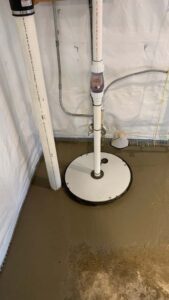
- Open windows that allow warm, humid air to enter the basement and condense on cooler surfaces.
- Water leaking in from around doors and windows.
- A high groundwater table can cause water to enter the basement through wall or floor cracks, even very tiny ones.
- Poor drainage is a major cause of excess moisture in basements. If excess moisture in the soil can’t drain off properly, hydrostatic pressure will build up and force water through tiny, imperceivable cracks in a foundation wall and into your basement.
- Gutters clogged with debris can cause water to spill over the side of the house and soak the ground around the foundation.
- Downspouts that are too short can cause water to accumulate in the ground around the house.
Excess moisture in a basement can lead to mold growth and other problems if left unchecked. One solution is to install a vapor barrier in your basement, which could significantly improve air quality and potentially lower your energy bills.
What is a Vapor Barrier, and Why Is It Needed in Basements?
A vapor barrier in a basement protects the area from moisture damage and keeps it comfortably dry by reducing the amount of moisture coming through the foundation walls.
Basements, because they’re below grade, are prone to excess humidity and moisture, which can cause mold growth and other problems. Installing a vapor barrier in your basement will help reduce the risk of damage by preventing water vapor from getting inside while also keeping your basement temperature more consistent. Of course, if you plan on finishing your basement to turn it into a living area, you’ll definitely want to consider a vapor barrier.
How to Know If You Have Moisture Issues in Your Basement
Most homeowners know when there’s excess moisture in the basement. Here are some things you might notice:
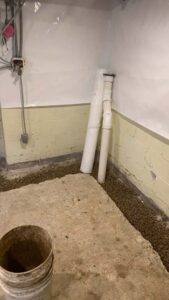
- A musty smell
- Visible mold and mildew stains on the walls, floor, or anything stored in the basement
- A feeling of dampness when you enter the space
- Visible water on the basement floor, trickling down the walls, etc.
Any of the above can indicate a moisture problem in the basement. If these issues coincide with weather changes like heavy rain or snowfall, then it’s an indication that water is entering the basement from outside, possibly due to cracks in the foundation wall.
For more information, see 7 Basement Waterproofing Solutions That Work.
The Benefits of Installing A Vapor Barrier In A Basement
Reduces moisture
A vapor barrier in the basement reduces moisture, which can cause mold and the deterioration of anything stored there.
Cleaner air in your home’s living area
Mold in a basement also causes air full of mold spores to flow up into your home’s living area via the stack effect. This can cause allergies and serious respiratory problems for anyone living in the house.
Potentially reduces energy costs
High moisture levels can increase energy bills because humid air is harder to heat and cool. So, installing a vapor barrier in a basement could lower energy costs.
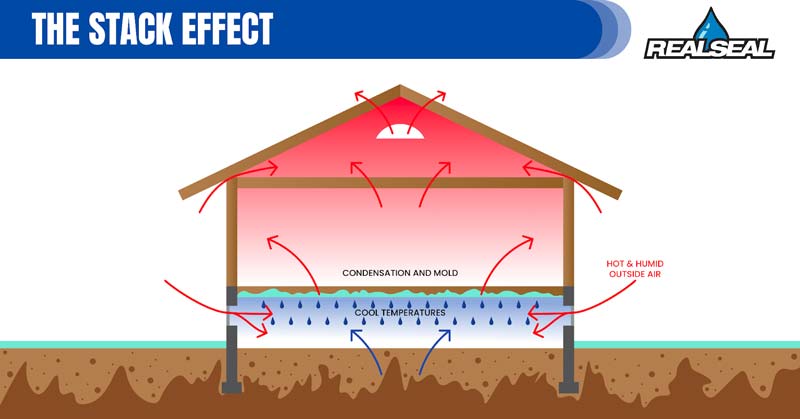
What About DIY Vapor Barrier Installation?
The idea of a DIY home improvement project to save money is always tempting. However, vapor barriers can be challenging to install properly. If the installation isn’t done correctly, moisture will be able to make its way into the basement despite the presence of a vapor barrier. This is because the vapor barrier must be sealed properly. Therefore, we don’t recommend homeowners attempt vapor barrier installation as a DIY project. It’s better to contact a professional with experience to ensure success and safety. Enlisting professional help gives you peace of mind that the job will be done right – with the proper assessments, solutions, and materials – so your investment will last longer.
Questions to Ask A Contractor before Hiring Them To Install A Vapor Barrier
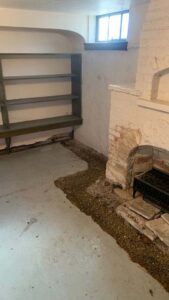
When looking for a professional to install a vapor barrier in a basement, ensuring you get the best quality service is essential. Ask questions such as the following:
- Ask the contractor about their experience and expertise installing vapor barriers in basements. Make sure they keep up with changing industry standards.
- Inquire about any local regulations that must be followed. Is the contractor aware of them?
- Ask the contractor installing the vapor barrier what type of protection they offer should anything go wrong after the project is complete. A warranty on the quality of the work will give you peace of mind at the end of the job.
Doing your research before hiring a professional is the best way to ensure a successful installation.
Other Steps You Can Take To Minimize Moisture In Your Basement
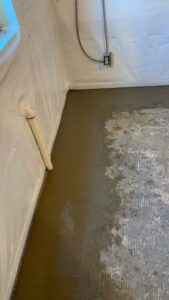
As a homeowner, minimizing moisture in your basement is essential to ensuring you have a dry and comfortable space. Taking the advice of a professional to install a vapor barrier is one way to reduce moisture, but there are also other steps you can take, including the following:
- Clean your gutters regularly, so they don’t get clogged with dead leaves and other debris. This could cause water to spill over the side of your house and soak the ground around the foundation.
- Install downspout extensions, so water is channeled away from the foundation before being released.
- Install a drain tile system. When it comes to foundation waterproofing, nothing beats a drain tile system. For more information on how they work, see How A Drain Tile System Can Save You Money.
- If necessary, regrade your yard, so it slopes away from the foundation. This will cause water to drain away from the foundation instead of towards it.
- Consider removing any flowers or shrubs planted next to the house, as this can also add unwanted moisture build-up.
All of the above work to keep your basement dry by ensuring the soil around the foundation isn’t full of excess moisture.
If you’re interested in having a vapor barrier installed in your home’s basement, contact The Real Seal today for a free evaluation and installation estimate. We serve Chicago and the surrounding area.
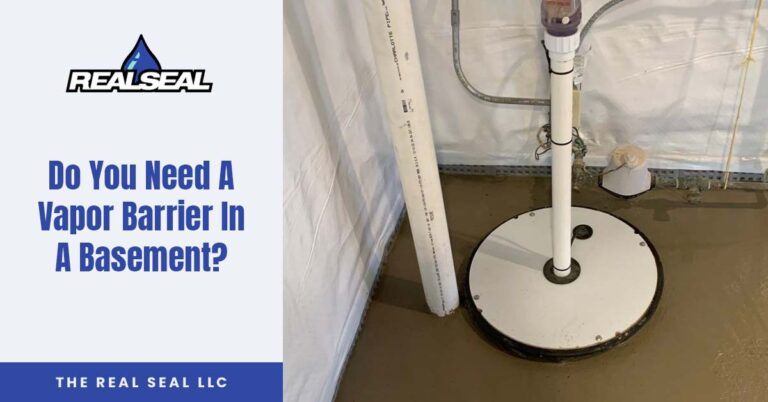
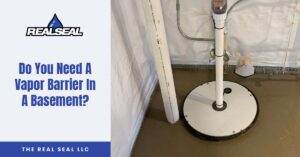
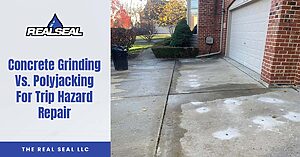
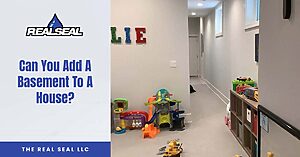
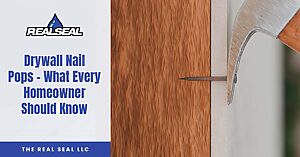
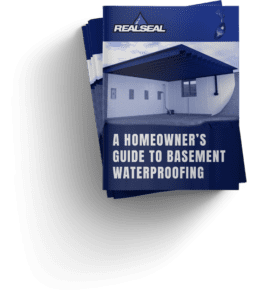

22 Responses
You never said what a vapor barrier is, even in the section that says “what is a vapor barrier.”
Hello!
A vapor barrier is simply a plastic sheet that stops moisture from penetrating. They can be used under concrete, in attics, and in our case, in basements and crawl spaces. Our Vapor Barrier consists of a 12 mil poly thread-reinforced sheet with an anti-microbial lining. To the eye, it will look like a flexible sheet of white plastic.
Name of Product ?
Names of the product vary depending on your area and where you get it. But basically, you are getting a minimum 12 mil, thread-reinforced, anti-microbial plastic sheeting.
I have a bi-level home. I have a problem with moisture and mold that got on the drywall on the south facing outside wall in the downstairs den It comes up about a foot and goes about 3 ft on both sides about maybe less They were going to take out a 4-foot by 15 ft of the drywall and put in a French drain on the inside of the house with a sump pump to the backyard and it is graded going downhill well enough for the pipe outside My question is if I just fix the gutter and fix the drywall remediate the mold from that do I need a drain system on the inside around the front wall and sidewall. The front wall did have some baseboard damage but no water noticed I’m not sure about the drywall behind it but on the outside of that wall there is no mold. There is a window on the front aspect of the house and on the side there is a window about 2 ft from the damaged area and a fireplace about 7 ft from the damage. But the gutters were completely clogged and away from the house I had a gutter guy there already and he tapped the nails in a little He said just brackets later. For the gutters to get them to hold on the fascia because all the nails were coming out which a handyman tapped back in for now.
Hi Margaret!
It sounds like your gutters were a big issue there. You can try fixing those and waiting through the next few storms to see any moisture coming through the wall. I would not suggest putting back drywall until you are SURE the issue is handled, or else you may need to take it down again.
In some cases, this is enough to work. But it’s impossible to tell until after the gutters are fixed and you get a couple big storms.
Great article! I never realized how crucial a vapor barrier is in a basement. I’ve been dealing with moisture issues for years, and this information really helps clarify why it’s so important. I’m definitely going to look into getting one installed. Thanks for the tips!
Glad you enjoyed!
Great post! I never realized how crucial a vapor barrier could be for preventing moisture issues in my basement. The tips on installation were really helpful. I’ll definitely consider adding one now!
You’re very welcome!
Great article! I never realized how crucial a vapor barrier is for basement moisture control. I’m definitely considering adding one now to protect my home. Thanks for the insights!
You bet, happy to help!
Great post! I never realized how important a vapor barrier is in preventing moisture issues in the basement. Your tips on installation were particularly helpful. Thanks for sharing!
Always happy to help!
Great article! I never really considered the importance of a vapor barrier in my basement until reading this. Thanks for the detailed explanations and tips!
Happy to help!
Great post! I’ve always been unsure about the need for a vapor barrier in my basement. Your explanations really clarified the benefits and potential issues. Thanks for sharing such helpful information!
You’re very welcome!
Great article! I never considered the importance of a vapor barrier in my basement before. The detailed information you provided really helped me understand how it can prevent moisture issues and improve air quality. Thanks for sharing!
You’re very welcome!
Great article! I never really thought about the importance of a vapor barrier in my basement. After reading this, I understand it can really help prevent moisture problems. I’ll definitely consider installing one now. Thanks for the insights!
Glad you got something out of it!